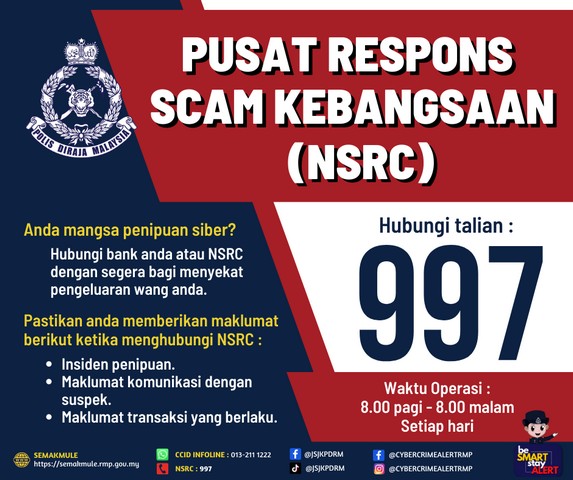Combating online fraud has been an ongoing effort for most countries worldwide. Malaysia is no exception to this, as it continues to keep track of the number of cases and the amount of losses accounted for from them.
From January up to 15 June 2024, a total of 14,490 online fraud cases were reported in the country, with estimated losses of over RM581 million. Most of these cases were telecommunication crimes, e-financial crimes, love scams, e-commerce crimes, and non-existent loans and investments.
These recent numbers suggest a continuing upward trend; to illustrate, there were 34,495 cases recorded in 2023, rising from 25,479 in the previous year.

More concerning was the total losses – from over RM851 million in 2022 to exceeding RM1 billion the following year.
Given the severity of the crime, the Malaysian Government through various agencies and departments together with the country’s financial institutions and telecommunication industry has been carrying out collaborative initiatives to ensure that the public are aware and vigilant towards online fraud.
For instance, the Bukit Aman Commercial Crime Investigation Department organised 3,689 crime prevention programmes from January to May 2024.
Last year, CyberSecurity Malaysia, CelcomDigi and Gabungan Bertindak Anti-Scam launched the National Anti-Scam Tour (Jelajah Anti-Scam Kebangsaan) with the support of the Ministry of Communications and Digital.

The nationwide tour focused on sharing information regarding the latest in the cyber security landscape, types of scam threats and modus operandi, as well as tips and best practices for the public to prevent themselves from becoming victims of scams.
Awareness and education among the general public is essential in curbing online fraud. In fact, it is one of the recommendations proposed by CelcomDigi in its National Scam Awareness Survey 2024 to expand scam or fraud awareness on multiple channels at the national level.

It follows results in the survey showing that while more Malaysians are knowledgeable of vulnerabilities that can lead to scams or fraud, some respondents may lack the resilience to tackle them, particularly in taking preventive and mitigating measures such as blocking phone numbers of scammers or suspected scammers; informing family or friends; and closing their bank accounts.
Awareness in Reporting Scams
It is also vital for people to be aware of avenues for reporting scams or fraud. In Malaysia, those who have fallen victim to such crime must contact their financial institutions before making a police report.
They can also call the 997 hotline of the National Scam Response Centre (NSRC), an operational centre that has been set up as a means to tackle online financial fraud by coordinating rapid responses, including speedy detection of stolen funds and enforcement action against offenders.

The initiative brings together resources and expertise from government and private entities, namely the National Anti-Financial Crime Centre under the Prime Minister’s Department; the Royal Malaysian Police; Bank Negara Malaysia; the Malaysian Communications and Multimedia Commission; financial institutions; and the telecommunications industry.
Since it began in 2022, NSRC has received 66,997 calls from the public last year, far higher than the record in its initial year of 12,253.
Bank Negara Malaysia in its 2023 annual report elaborated that out of the number of calls the centre attended in 2023, around 38 per cent or 25,991 came from scammed victims.
In the same period, NSRC detected and blocked 59,684 suspected mule accounts (used to receive and transfer money that is obtained illegally on behalf of others) to stop transactions from being layered on top of one another to conceal the source of stolen money.
It also opened 8,754 investigation papers involving cheating and freeze orders on specific collection accounts totalling RM69 million.
To strengthen NSRC’s operational capabilities, the country’s central bank together with financial institutions and Payments Network Malaysia Sdn Bhd launched the National Fraud Portal in August 2024.
The integrated platform automates scam reporting and fund tracing processes, as well as ensures effective industry-wide information sharing and cooperation and data-driven mule assessments.
However, there is still a need for NSRC to be made known to the general public as a key channel for scam or fraud reporting. The aforementioned National Scam Awareness Survey 2024 has discovered that many of its respondents are unaware of such avenue, especially those who are financially distressed.
Thus, CelcomDigi recommends for the centre to bolster its role by incorporating “broader dissemination of its services to the public and enable more Malaysians to benefit from its services.”
Learn more about NSRC at https://nfcc.jpm.gov.my/index.php/en/faq/about-nsrc. To stay up to speed with the latest on financial scams, visit and follow the Amaran Scam Facebook page (facebook.com/amaranpenipuan) or the #JanganKenaScam website (jangankenascam.com).
Reference:
About NSRC. (2024, July 3). National Financial Crime Prevention Center. https://nfcc.jpm.gov.my/index.php/en/faq/about-nsrc
Bank Negara Malaysia. (2024, August 20). National Fraud Portal to solidify coordinated efforts in curbing financial scams [Press release]. https://www.bnm.gov.my/-/nfp-launch
BERNAMA. (2024, June 27). 14,490 cases of online fraud recorded in first half of this year – Kulasegaran. BERNAMA. https://www.bernama.com/en/news.php?id=2311959
CelcomDigi. (2024, July 22). 2024 Scam Report: Malaysians are still susceptible to scams despite high awareness [Press release]. https://corporate.celcomdigi.com/news/2024-scam-report-malaysians-are-still-susceptible-to-scams-despite-high-awareness
Lim, J. (2024, March 20). Calls from public about online scams jumped five-fold in 2023, says BNM. The Edge Malaysia. https://theedgemalaysia.com/node/705237
Tan, R. (2023, February 18). Minister: Govt launches “National Anti-scam Campaign 2023” to counter evolving scam techniques. Malay Mail. https://www.malaymail.com/news/malaysia/2023/02/18/minister-govt-launches-national-anti-scam-campaign-2023-to-counter-evolving-scam-techniques/55604






